#and down to master chief and the now one survivor of the communications unit
Text
don't mind me I'm just in a glass case of emotion
#micky watches halo#halo spoilers#in the tags at least#like you got your typical sci fi horror#and down to master chief and the now one survivor of the communications unit#and just like sure maybe standard procedure but also master chief immediately closing ranks and covering perez's back#physically making contact while she picks up the shotgun and makes an effort to reach out and ease her fears some?#I'm#this is going to live rent free in my brain and is definitely inspiring fic
0 notes
Photo
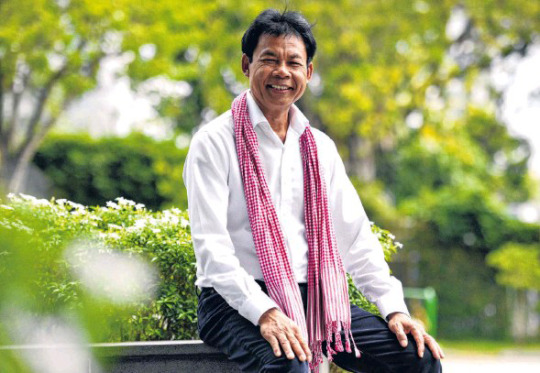
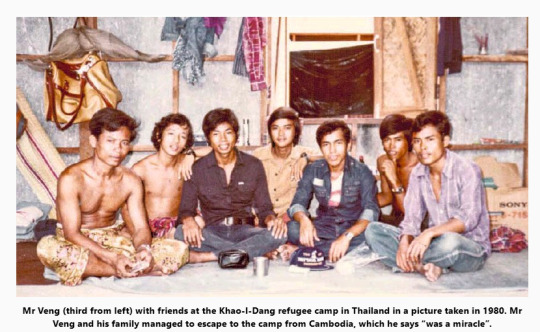
He Starved, Suffered and Nearly Died, but Never Lost Hope
Genocide survivor went on to be a Cambodian minister, and seeks now to inspire the young
The Straits Times 22 Mar 2020 Wong Kim Hoh Senior Writer [email protected]
PHOTOS: KELLY HUI, VENG SEREYVUTH
Veng Sereyvuth has a passionate belief.
“You are born with the power to dream, to make choices, to craft your destiny. No one except you can steal that from you,” he says.
Before you dismiss that as a platitude, consider who he is and what he has gone through.
The 61-year-old survived the Cambodian genocide during which more than two million people died under the Khmer Rouge, which was in power between 1975 and 1979, led by Marxist leader Pol Pot.
His life has been both a melodrama and a potboiler: a village boy who became a cyclo driver, a smuggler, a prisoner, a refugee, a political science graduate and, eventually, a politician who served as Cambodia’s minister for tourism and minister for culture.
Along the way, he starved, suffered and stared death in the face on several occasions. But through it all, he never gave up hope.
Today, he is a businessman and educationist; he has built hotels and other properties and is chairman of the board of trustees at the Pannasastra University of Cambodia, a private university in Phnom Penh which provides an English-based education.
Mr Veng does not have the statesman-like gravitas one expects of someone who has spent more than two decades as a senior minister.
Dressed in jeans and a white shirt with a cotton krama (a traditional Cambodian scarf) around his neck, he radiates approachability and joviality.
He was in Singapore recently to put the finishing touches to No One Born Poor: Prisoner, Politician, Pioneer, a book about his life published by Write Editions and available at major bookstores in June.
Calling the book a tribute to the country he loves, he hopes that his story of “challenging life, confronting the unknown and embracing its ups and downs” will give hope to many people, especially the young.
He was born the second of six children in the remote village of Prey Deoum Thieng in the Cambodian province of Prey Veng.
His father was a teacher and his mother ran a provision shop. The couple later separated, and Mr Veng and his siblings were raised by his mother, whom he describes as a “commander-in-chief” and the strongest person he knows.
Life in the village was idyllic. He loved going to school, spurred on by his mother who fervently believes that education is not just the ticket to a better life, but also makes one a better person.
But civil strife soon rocked the country when a military coup overthrew head of state Prince Norodom Sihanouk in 1970.
The Khmer Rouge started becoming more powerful; they were communist revolutionaries who saw religion, education and freedom as dangerous.
Realising that life in their village was getting untenable, Mr Veng’s mother decided to uproot her brood to Phnom Penh in 1972.
She decided to do it first with Mr Veng, who was then just 12, before coming back for her other children.
Because the Khmer Rouge killed villagers who tried to flee for the city, mother and son escaped through rice fields in the dark of the night before taking a boat across the Mekong to get to Phnom Penh.
“It was a real ordeal, a life-anddeath situation. I saw dead bodies, and heads on bamboo poles,” recalls the amiable man whose other siblings arrived in the city several weeks later.
With no income from a provision shop to feed her brood, his mother started selling noodles.
Mr Veng continued his education at a French Catholic school, but sold bread to office workers before classes began and became a cyclo – a three-wheeled taxi – driver after school ended.
Life was tough but as he writes in his book: “I didn’t see myself as a cyclo driver, as it was not my final mission in life. It could not be. It must not be. The cyclo was a tool to meet two needs: to fill my stomach and pay for my education. Nothing more, nothing less.”
In 1975, the Khmer Rouge won the civil war and captured Phnom Penh. They emptied the cities, forcing millions of Cambodians, including Mr Veng’s family, back to the countryside.
Not long after they began their trek to a village in Prey Veng, Mr Veng’s mother told him to go back to their Phnom Penh home to get a 20kg pot of preserved fish because it would provide sustenance for their month-long journey.
But the then 15-year-old was stopped by soldiers who ordered him to turn back. When he moved forward, a soldier pointed a gun at him. Mr Veng begged for permission to get his pot of fish. To his surprise, the soldier let him through.
The episode taught him one thing: You need courage and conviction for everything you do in life.
“For me, it means protecting the preserved fish, at all costs, for my family.”
The Khmer Rouge were brutal in their quest to set up an agrarian utopia, torturing and killing intellectuals and anyone else they considered a threat to communism.
Mr Veng and his brothers escaped death, but, like millions of their countrymen, were sent to slave at labour camps.
The Khmer Rouge lost their grip on power in 1979 when Vietnamese forces took control of Phnom Penh.
It was not just another chapter in the country’s history but also in his life. To help his family survive, he became a smuggler, sneaking to the Thai border to buy cartons of cigarettes – apparently more valuable than money then – which he would trade or sell.
It nearly cost him his life on several occasions. Once, he was denied entry at a checkpoint by soldiers who wanted his cigarettes.
To get across, he made eye contact with people on the other side of the metal barrier and told them in a low voice to leave a gap for him to pass through when the barrier was lifted.
He made a dash for it on his bicycle, pedalling furiously as the sound of bullets reverberated behind him. By the time he stopped, his feet were bloody from the desperate pedalling.
Asked if he has ever thought about death, he says with a laugh: “When you live in a structured and orderly society, you think about things like that. But when you live in hell...”
He continues: “I had no choice. I just did what I needed to do to feed the family. You get out of a situation first and get scared later. You deal with death only when it comes.”
His family cried each time he went away because they were worried he might not come home.
“Every trip was three weeks or a month long. Things could happen: sometimes you could not get the goods, sometimes there were shootings, sometimes you just could not get back i nto Cambodia. I had stayed in forests where I just ate what I had and what I could find.”
Hunger was a constant companion. “You can check with your doctor friends but when you’re really hungry, your stomach feels like it’s being cut into pieces with a knife,” says Mr Veng, who was once so weak from hunger he had to be propped into a sitting position at mealtimes with a rope tied to the ceiling.
The year 1979 also marked one of the lowest periods in his life.
Soldiers stopped him on his bicycle while he was riding home to Prey Veng with a sack of 200 bicycle spokes he hoped to sell. They accused him of sending the spokes to the Khmer Rouge and threw him into a dark prison for a month.
Then, one day, he was taken blindfolded to the Mekong. He felt a gun muzzle on his left cheek, and heard the weapon being cocked as he was asked if he was part of the Khmer Rouge.
He just blurted: “I’m a student.” That split second of telling the truth, he says, spared him from getting his head blown off.
The era of the Khmer Rouge might have been over but fear and uncertainty still blanketed the country.
Overwhelmed by the hopelessness, he and his family decided to “turn this game of life around” and take the big risk of escaping to the Khao-I-Dang refugee camp – set up in late 1979 and run by the Thai Interior Ministry and the United Nations High Commissioner for Refugees – across the Thai border.
They split into two groups. He and two of his sisters set out first. The plan was to reunite with his mother and other siblings at the refugee camp.
Thousands had died undertaking the weeks-long journey which was fraught with many dangers, from landmines to trigger-happy soldiers. Mr Veng and his two sisters moved mostly at night to avoid getting caught.
They made it, and so did the rest of the family.
“It was a miracle. The border stretched for hundreds of kilometres but we managed to find one another,” he says.
They stayed in the camp for one year.
“It was a completely different life. There were no guns and no fear. You mingled with other people and walked about freely in the camp. You could sleep and wake up, a free man.”
Nearly a year later, the family were told that they would be going to New Zealand.
“It was surreal, we were speechless,” recalls Mr Veng, who landed in Auckland with his family in September 1980.
There, he worked at several places including a printing firm and an ice-cream shop while attending English, maths, economics and accounting classes at a polytechnic.
In 1984, he got accepted into the University of Victoria on a special admissions scheme. It was hard because he had not mastered the English language, but his will bulldozed through the obstacles, and he graduated with a degree in political science in 1987.
He never forgot Cambodia though. For a year, he was haunted by nightmares of what he had lived through. To exorcise his demons, he shared his story openly with his lecturers and classmates.
He also joined the secretariat of the Khmer Association in New Zealand to help new refugees adapt to life in the country. The association also built the first Cambodian pagoda in the country.
The urge to return to help rebuild his homeland was “instinctive”.
“It’s my country. It’s where I came from and I wanted to give back. Gratitude is my attitude,” says Mr Veng, who spent more than a year working as a taxi driver – “you can make a lot of money” – before heading for Bangkok in 1989.
He could not enter Cambodia because the country was still in political turmoil. In Bangkok, he volunteered with The National United Front for an Independent Neutral and Cooperative Cambodia and worked with refugees along the Thai border.
In 1993, he took part in Cambodia’s general election and became a member of Parliament as well as minister for tourism, a post he held until 2004.
“It was one of my top achievements,” says Mr Veng, who was also minister to the council of ministers and minister for culture.
Among other things, he chaired an initiative to step up the flow of tourist dollars in the region, resulting in the signing of the Asean Tourism Agreement in Cambodia in 2002.
Except for two of his sisters, Mr Veng’s mother and other siblings have also returned to live in Cambodia. He has a son, 22, who is studying public policy at the University of Victoria; his former wife died in an accident several years ago.
The congenial man, who holds both Cambodian and New Zealand citizenships, went into business after leaving politics in 2013 but focuses a lot of his attention on education for young Cambodians.
Mr Veng, who often gives talks to inspire others, says his philosophy in life is simple.
“I believe that on the canvas of humanity, we are to paint goodness: the able extending goodness to those without hope, the distressed and the needy.”
Chairman of the Board: H.E. Veng Sereyvuth held various ministerial positions in the Royal Government of Cambodia since 1993, including co-minister of Council of Ministers, Senior Minister of Tourism, and Senior Minister of Art and Culture. H.E. Veng Sereyvuth received a Business Administration's degree from Victoria University Wellington, New Zealand;
0 notes
Text
USS Liberty Veterans Association BANNED FOREVER From the American Legion National Convention
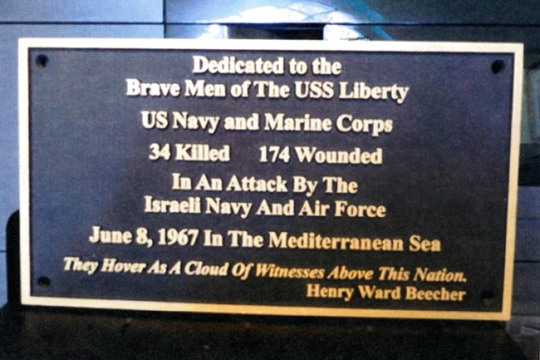
An American Legion membership card fluttering down and landing softly on the blouse of an American Legion clerk results in the USS Liberty Veterans Association being BANNED from The American Legion National Convention FOREVER.
By Joe Meadors, reposted from the USS Liberty Veterans Association Blog
"You will not discuss the attack with anyone. Once the Court of Inquiry findings are released you will not contradict them. This order will remain in effect after you are discharged from the Navy. If you violate this order you will be prosecuted and will spend a considerable amount of time in a Federal Prison."
This order was repeated every day at quarters while we were in drydock in Malta.
If anyone tells of witnessing the deliberate machine gunning of our life rafts in the water, he runs the risk of doing time in a Federal prison.
If anyone tells of witnessing the use of unmarked aircraft or of the jamming of our radios on both US Navy tactical and international maritime distress frequencies, he runs the risk of doing time in a Federal prison.
We cannot talk about this among ourselves. We cannot talk about this with our family. We cannot talk about this with any counselor. We cannot talk about this at a meeting of any veterans group we may become involved with. We cannot talk about this with our Congressional Delegation. We cannot talk about this at The American Legion National Convention.
We cannot talk about this with anyone.
If we do, we risk Federal prison.
But we defy the Federal Government and speak about the attack anywhere we can.
But now we cannot talk about it at The American Legion National Convention.
In an email to the USS Liberty Veterans Association, Kevin J. Bartlett, J.D., National Judge Advocate of The American Legion (and US Navy Veteran) writes:
I understand that your organization would like to submit an application for a booth at The American Legion National Convention in August.
The USS Liberty Association is not allowed to rent a booth at national conventions and have them staffed because one of your members committed assault and battery on one of our staff and was convicted of his crimes. In addition, members of your organization have attempted to set up in the national convention exhibit hall without renting a booth.
The American Legion has a 100-year track record of helping veterans and their families. Unfortunately, we've had a long and unpleasant history with the USS Liberty Veterans Association, and we have chosen not to do business with them.
The American Legion has known for decades the constraints we have had place on us. Do they care? No.
Instead of offering us the honor, support and compassion they routinely offer their members, they have chosen to take an relatively minor issue that was largely of their making, blow it all out of proportion, accuse someone they claim to be a USS Liberty survivor of trying to set up an unauthorized booth and ban us from their National Convention forever.
All without the opportunity of appealing their decision. And without any reference to their Constitution and bylaws or Resolution that allows them to take the action they did.
This action by the hired help of The American Legion National Headquarters wasn't taken in a vacuum. The National Organization has a long record of trying to stifle USS Liberty survivors in our effort to tell the story of what happened on a US Navy ship. Given the tremendous support we have from the rank and file of The American Legion, it is clear that The American Legion National Headquarters is governing by fiat instead of by the rule of its membership as reflected in Resolutions initiated by its local posts.
An extensive and heavily footnoted telling of the history between The American Legion and the USS Liberty Veterans Association is available here. We are indebted to If Americans Knew for the effort they made to so expertly outline the history between the two veterans groups.
IAK writes:
Legion bigwigs have torpedoed American Legion members' resolutions supporting the Liberty; prevented dissemination of information about the attack; refused to allow a booth by the Liberty Veterans Association at its 2013 national convention; and privately attempted to convince the Veterans of Foreign Wars to similarly prohibit a Liberty booth at its national convention.
In 2002 the Washington DC Legion delegation introduced a resolution calling for an investigation of the attack to a foreign relations subcommittee at the national convention. This was the first step towards procuring an American Legion resolution.
I was present at this convention and witnessed most of what subsequently transpired. I had begun to investigate Israel-Palestine in fall 2000, a topic I had never previously studied. I was astonished at much of what I discovered, including the Israeli attack on the Liberty, which I had never heard about despite growing up in a military family.
When I heard that a resolution was going to be introduced at the national convention, I went with the delegation to observe what happened.
When the DC group introduced the resolution to the subcommittee, every American Legion delegate who addressed it spoke in favor of it. Delegate after delegate from diverse parts of America supported the resolution, and it was passed without objection.
The DC delegates were jubilant. When a resolution is passed at this level, they explained, it is virtually assured of adoption. Typically, the resolution is then rubber-stamped by the next committee, and passed along to the general membership, which then normally passes all such committee recommended resolutions by one simple voice vote.
This resolution, however, was to be different.
The next day, American Legion staff told the Convention Committee on Foreign Relations that there was no need for such a resolution since the Legion already had passed resolutions on the Liberty. The staff and chair neglected to state that not a single resolution on the USS Liberty was live, and that therefore it was both necessary and appropriate to pass this one.
This communication succeeded in killing the resolution. The main staff member for this committee had served in Israel; it is possible he is an Israeli citizen. The Committee chairman was Thomas Bock, of Colorado. Three years later Bock was American Legion National Commander.
That evening, back in D.C., Admiral Thomas Moorer (USN retired) heard about the scuttling of the resolution. Outraged, he wrote an open letter to the American Legion Commander requesting that the resolution be put before the general membership.
Admiral Moorer was chairman of an association of admirals and generals who want the US government to conduct a hearing on the USS Liberty. He was also the former Chairman of the Joint Chiefs of Staff -- the highest ranking military officer in the U.S. military -- and a retired 4-star admiral who was once in charge of both the Pacific and Atlantic fleets. He was a Naval aviator and World War II hero; the Navy's Tomcat fighter jet was named after him.
Moorer had long been outraged at the cover-up on the Liberty attack. In a 1997 memo, he called it a "wanton, sneak attack," writing: "What is so chilling and cold-blooded, of course, is that they could kill as many Americans as they did in confidence that Washington would cooperate in quelling any public outcry." Many of the crewmembers, Moorer wrote, were from “small country towns, probably a lot like Eufaula, Alabama, where I grew up, and they represent the basic core of America...."
One has only to look to their reference to the USS Liberty in their Leadership FAQ to learn that they have chosen to support a Revisionist version of the attack instead of one supported by evidence and facts.
What is The American Legion doing about the USS Liberty tragedy?
The tragic mistaken identity attack by Israelis on the USS Liberty on June 8, 1967 provoked a great deal of controversy among surviving members of the crew and family members. Though residual anger and suspicions remain, the incident was the subject of ten US investigations and three by the Israelis. In the American investigations, the full weight of the US Government allowed access to all of the relevant security information. Though some accusations were made suggesting the reports sought to hide facts or protect Israel, no credible evidence for these charges has been produced at the US Government level.
The Foreign Relations Convention Committee of The American Legion reviewed the action taken by OSD and Congress on this incident and they voted to reject Resolution 235 submitted by the Department of District of Columbia at the 84th Annual National Convention in Charlotte, North Carolina, August 2002.
This position is a gross misrepresentation of the evidence currently available -- a fact that we have made The American Legion aware of but they are obviously not interested in acknowledging.
In the first place, there is no "controversy among surviving members of the crew and family members."
Second, the incident was NOT "the subject of ten US investigations and three by the Israelis." Prove that for yourself by emailing your Congressional Delegation and ask them to send you a copy of the Congressional investigation of the attack. They won’t be able to send you one because it doesn't exist.
Third, Congress hasn't taken any action on this "incident" so what the Foreign Relations Convention Committee reviewed is in question. A question The American Legion refuses to (i.e., cannot) answer.
Why would the leaders of a Federally chartered (pdf) veterans association claiming a mission "To uphold and defend the Constitution of the United States of America," "To foster and perpetuate a one hundred percent Americanism," and "To make right the master of might" ban a group of American veterans who are the victims of War Crimes committed by our "best ally and only friend in the Middle East" from attending any American Legion National Convention forever?
Did I just answer my own question?
Are the leaders of The American Legion afraid that their members will learn about the War Crimes Israel committed during the attack and are blowing up this relatively minor event to prevent our relating the history of the attack during their National Convention?
This unilateral action by The American Legion was not taken in a vacuum. The American Legion and the USS Liberty Veterans Association have a long history. That history, in our opinion, shows a concerted, illegal and borderline treasonous effort by The American Legion National Organization to deny its members the right of hearing first-hand accounts of the attack on the USS Liberty.
To be perfectly clear, no one is denying the seriousness of a charge of assault and battery. Nobody is denying the fact that a USS Liberty survivor was convicted of assault and battery on a staff member of The American Legion.
What happened that resulted in the assault and battery being committed? It all takes place as we were attempting to register at the 2012 National Convention.
Due to a communications error on our part, our delegation intending to staff our booth at the 2012 American Legion National Convention was unaware that payment for that booth and information about the requisite insurance had not been submitted to The American Legion prior to their arrival.
Upon learning that the payment had not been made, our representatives inquired if payment could be made while they were there.
Instead of responding to the inquiry, the registration desk called their security personnel who asked that our delegation be removed from the premises. The security personnel were obviously expert in intimidation -- which was in full flower during the one-sided confrontation.
Having survived not only the attack and the US government's disinterest in investigating that attack, but the history the USS Liberty Veterans Association has had with the higher-ups of The American Legion, one of our representatives out of frustration, took out his American Legion membership card and flicked it to no one in particular. He just wanted to be rid of it.
As luck would have it, it landed softly on the blouse of one of the ladies manning the registration desk. So soft that I doubt she felt a thing.
The American Legion called the police and had our representative arrested for assault and battery. He was taken to jail and released after receiving a court date.
When the date arrived to face the judge, our guy showed but The American Legion victim was nowhere to be found.
No doubt out of embarrassment that the very people The American Legion was established to help were being treated so poorly.
Which brings up the question, "What is the purpose of The American Legion" and why in the past 52+ years has The American Legion treated the survivors of the USS Liberty as an exception to that purpose?
Why has The American Legion National Organization shown more concern for the forces who attacked the USS Liberty than it has for their own countrymen?
Why has The American Legion National Organization felt it so important to stifle USS Liberty survivors that they have acted illegally to do so?
Let me suggest some reasons:
We were attacked by Israel.
We have insisted that The American Legion live up to its obligations as described in the Preamble to their Constitution (pdf).
We were attacked by Israel.
We have highlighted the hypocrisy of The American Legion in allowing its 1967 Resolution 508 to be ignored and unimplemented until it is finally rescinded in the 1990's.
We were attacked by Israel.
During the many times we were allowed to purchase a booth at The American Legion's National Convention we were welcomed with enthusiasm and support by the general membership of The American Legion.
We were attacked by Israel.
At their 2018 National Convention, the membership of The American Legion ignored the recommendation of The American Legion's leaders and approved a resolution calling on the Congress of the United States to investigate the attack on our ship.
We were attacked by Israel.
If you find the actions of The American Legion National Organization as disconcerting as we do, we urge you to submit two resolutions through your Post.
If nothing else, it will educate you on what The American Legion National Organization feels about the USS Liberty and USS Liberty resolutions.

This work is licensed under a Creative Commons Attribution-NonCommercial-ShareAlike 4.0 International License.
0 notes
Video
youtube
Al Penn and Kieffer Sutherland in designated Survivor on Netflix
The admiral of the united states can’t capture a smash.
His rating within the polls as he runs for re-election is shaky.
contributors of assembly bang him as an “adulteration admiral.
” His campaign manager pleads with him to focus more on getting re-elected, besides the fact that its capacity taking part in dirty towards his opponents. And his smiling affectation alongside a businessman and the multi-millionaires -year-old wife has sparked an immense uproar.
Troubles also accost the admiral’s guys and women.
His arch of personnel is preoccupied along with his biologic-absorbed spouse who has relapsed. His Latino carnality-presidential opts for is grappling with the sharp focus on his indigenous id. And the president’s transgender sister-in-law has been receiving loss of life threats.
this is definitely not the White condominium of admiral Trump.
it is the White House of “unintended president” Tom Kirkman, the reluctant flesh-presser played by means of Kieffer Sutherland on the centre of ‘distinct Survivor,’ which has returned for an RD division on Netflix afterwards actuality annulled through ABC. The demonstrate has gone through a makeover with a beneath division, a brand new showrunner and a whole new autograph group of workers that has injected the sequence with more principal storylines.
The rebooted ‘distinctive Survivor’ is among the aboriginal examples of Netflix rescuing a broadcast network collection that had been dumped. The alive provider also picked up ‘Lucifer,’ which become alone by means of Fox after three seasons.
but whereas ‘Lucifer’ in its just-launched fourth season largely keeps the tone and vibe of the community version, ‘designated Survivor’ is clearly distinct.
- NEAL BEAR | got the ambassador
“here is a series about these days,” says got ambassador and new showrunner Neal Bear, whose credit include ‘ER,’ ‘below the dome’ and ‘law & order: particular Victims assemblage.’ He also happens to be a paediatrician. Bear says he desired to deliver one of the vital situation-oriented flavours from his past suggests to ‘designated Survivor.’ The ball can also have the same White condominium atmosphere and a few contributors of the customary forged, however, the plots are more contemporary, framed within the arena of a political campaign. The accent is rawer, with profanities that might on no account be accredited on advertisement TV. actual documentary photos with precise Americans discussing considerations corresponding to infant marriage and the prohibitively excessive can charge of prescription medicine had been amid into the demonstrate.
“There are so many issues that I wish to explore that I will be able to explore with this Belvedere,” Bear says in an interview at a cafe close his Brentwood domestic. With simply a number of exceptions, advertisement network suggests, he says, have moved far from exploring topics consistently tackled by means of those groundbreaking dramas, together with gun control and abortifacient.
“I can’t see the networks accomplishing these sorts of suggests now,” he says, “because their company mannequin is appealing to the widest variety of individuals viable without offending them. I don’t believe you get that variety of mighty storytelling that we used to do, that I was able to do.”
the brand new ‘designated Survivor’ has introduced some frequent faces to the solid together with Anthony Edwards ‘ER’ as Mars Harper, Kirk man's chief of body of workers; Julie White ‘Transformers’ as his take-at-any-cost crusade supervisor Lorraine Simmer, and Lauren Holly ‘wooden Fences’ as Harper’s opioid-addicted wife Lynn Harper.
At its amount, ‘designated Survivor’ is a character-pushed exploration of what can occur when a baby-kisser who is dedicated to public service is verified by his own very own ambitions.
“We wish to ask the query, ‘Can Tom Kirkman bathe in a muddy political stream and never get soiled?’” says Bear, his phrases abounding at a quick-fireplace tempo as he becomes extra aflame in anecdote the display. “We see him go down and bottom ward and bottom ward. It’s an apologia of our instances — can a man of dignity, honour and integrity preserve those values in nowadays political local weather? It’s a big fight.”
Sutherland, who is additionally an executive ambassador, says in a phone account that he becomes overjoyed with the collection’ new artistic course, stepping into areas that had fabricated admiral at ABC a little bit squeamish.
“Neal had an extremely potent feel of what he desired to do,” Sutherland says. “We may lean into an extra useful feel of what became happening on the White condominium. I am actual beholden to Netflix for that.”
within the collection at the start created with the aid of David Guggenheim, Kirkman, a low-level cupboard member, becomes an administrator in arch after the president and pretty much all individuals of Congress are wiped out in access at the Capitol right through the accompaniment of the abutment address. apart from depicting the pain of Kirkman, his wife Alex Natasha Cellphone and their two infants as they regulate to their new role as the first family, the exhibit also incorporated an artifice revolving round hard-bitten FBI abettor Hannah Wells Maggie Q, who discovers there’s a frequent conspiracy in the back of the explosion.
The ball turned into a brusque about-face for Sutherland, who denticulate with critics and admirers with his portrayal of bent agent Jack Bauer in ‘.’ instead of searching down nefarious guys and extenuation the world, Sutherland traded Bauer’s gun for a swimsuit and scholarly glasses.
That dramatic about-face from Bauer attracted Sutherland: “It was a captivating chance to do a show about a good guy, and even if he and his household could be able to sustain their moral compass and appropriateness being befuddled into the admiral. It provided loads of alternatives to talk about in reality vast considerations and remember on some level why the bureaucracy of executive makes what looks glaring to the relaxation of us — the correct component to do — so complicated. you could see politics through a more innocent prism.”
however ‘designated Survivor’ in its aboriginal two seasons turned into often an afraid mix, leaping amid the White house studies and the action-aggressive abstruseness artifice driven via Wells.
Bear says he was pitched the series within the aboriginal season, however, became it bottom ward afterwards speak me with producers who had developed the drama.
“I remember asking, ‘What’s the conspiracy? where does it go?’” he recalls. “individuals couldn’t retort some of these questions. I study the pilot and concept it turned into interesting, but changed into worried it wasn’t the correct show for me again. having completed network TV. for -ordinary years, I discovered it extra limiting as time progressed.
”Sutherland acknowledges that he also acquainted the exhibit every now and then fell brief all the way through the first two seasons: “there have been instances after we struggled to attain its competencies. Kirkman became practically a sufferer, put in an unwinnable situation.”
behind the curtain problems and artistic adjustments also created difficulties. A circulate of showrunners got here and larboard. Viewership trailed off, peculiarly within the Nd division, and ABC passed on a renewal.
Peter Minelli, the arch method administrator of film and TV. for e One, the flat and creation business behind the collection, says, “In both seasons, we could t locate the correct showrunner. however, we found that in Neal, who has done a masterful job. And it’s the variety of serialised exhibit that Netflix wanted.”
Switching up the theory — accepting Kirkman run for re-election as an independent — was key to moving the tale ahead. “we are able to take on the correct and the left,” Bear says with a smile. “nobody is secure from our keyboard.”
“The second you originate with a campaign, Tom Kirkman has made the choice to regain vigour,” Sutherland says. “It’s well-nigh a click on towards him — he wishes this now. You need to look at the explanation of why.”
“For each Neal and I, it turned into an interesting place to launch,” Sutherland continues. “We see the effects of him actuality president for years. The look for energy — why do you desire it and what are you going to do with it?”
Kirkman is additionally a widower — his spouse changed into killed right through the d division in a site visitors accident.
Sutherland says he changed into dissatisfied, but not devastated by using ABCs choice to now not adjustment an RD season.
“We had a pretty good relationship with ABC for years,” Sutherland says. “With a community, it’s never about one distinct exhibit. It’s a whole band-up for a whole night, so there is a thousand explanation why something may additionally now not determine. It wasn’t as lots of a disappointment as you may suppose.”
Furling that optimism became the realisation that ‘designated Survivor’ and Sutherland have a major international fan spoiled. while ABC most effective had the American rights to the sequence, Netflix had the foreign rights and saw the cost in deciding upon up the series.
Sutherland additionally appreciated the conception of a ten-episode division — the sequence on ABC had episodes within the first division and in the Nd.
besides exploring Kirk man's own experience, Bear had a laundry record of concerns he wanted to explore: voter indifference, the high can charge of drugs for all times-bullying diseases, world abating, how the gene-modifying expertise CRISP should be would becloud very well be acclimated as a biological weapon.
“I instructed Kieffer I used to be going to give him a transgender sister-in-legislation and solid Jamie Clayton, who was on ‘Sense’ and is an auto aerialist,” he says. “I gave Lauren Holly’s persona an opioid dependency — I definitely wanted to get into the groups that aftermath them.
I needed an HIV fable showing two African American homosexual men in adulation, and what it’s want to be ephemeral. That’s in no way been executed on TV. before.”
abiding cast affiliate Adam Canto, who performs countrywide safety adviser Aaron shore, is termed as Kirk man's carnality presidential working buddy. “He’s the primary casual Latino vice presidential applicant,” Bear says. “He’s seen through the crusade supervisor Lorraine as actuality Latino enough. however, issues get a bit dicey when his girlfriend Isabel Elena Ovary is a little too Latina. That’s an activity to show people off. That occurs in the back room the entire time. We desired to include the truth of that.”
Maggie Q is additionally abiding by the series, however, her persona has been kicked out of the FBI. She’s now a CIA investigator who begins looking into the possibility that an enemy force is using CRISP in a bio-agitation campaign.
remaining at the centre of the collection, although, will be Kirkman.
“Inherently the audience might be acclaim for him, in the course of the crusade and the concessions and selections hell must accomplish,” Sutherland says. “It’s going to place his morality and appropriateness in the query. And the audience will delay until the end to peer if he can come back from that or now not. That’s a fascinating ball to me. It’s so simple as that.”
Don’t omit it!
DESIGNATED SURVIVOR is streaming now on Netflix.
#Al Penn#Kieffer Sutherland#distinctive Survivor#biologic-absorbed#Latino#transgender#White House#Tom Kirkman#ABC#netflix#Lucifer#fox#Neal Bear#law & order#law and order#Brentwood#Anthony Edwards#Mars Harper#Sutherland#Maggie Q#entertainment
0 notes
Photo
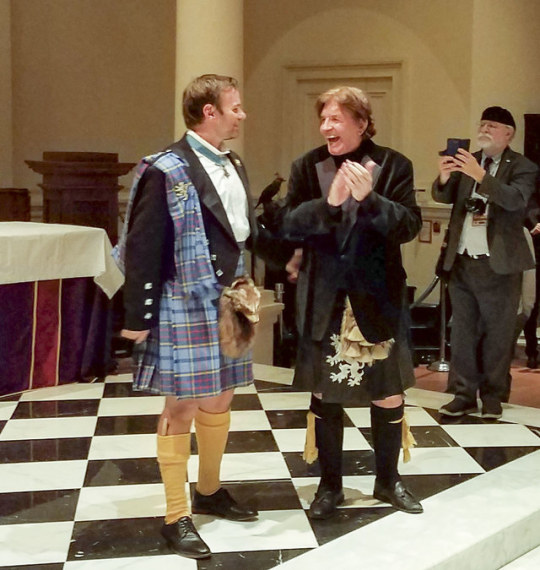
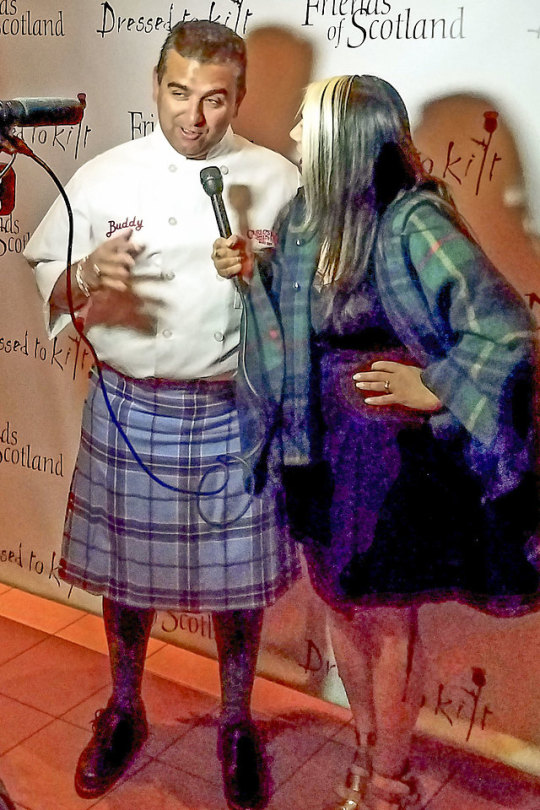
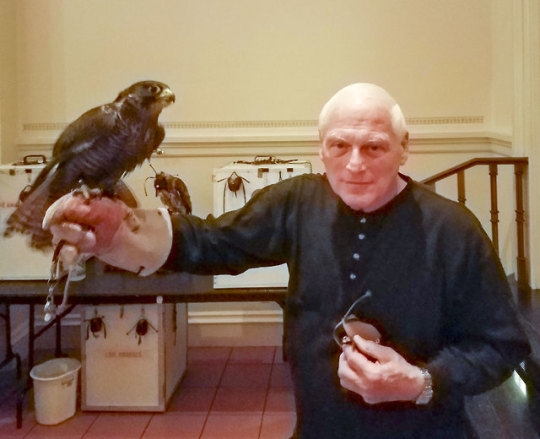
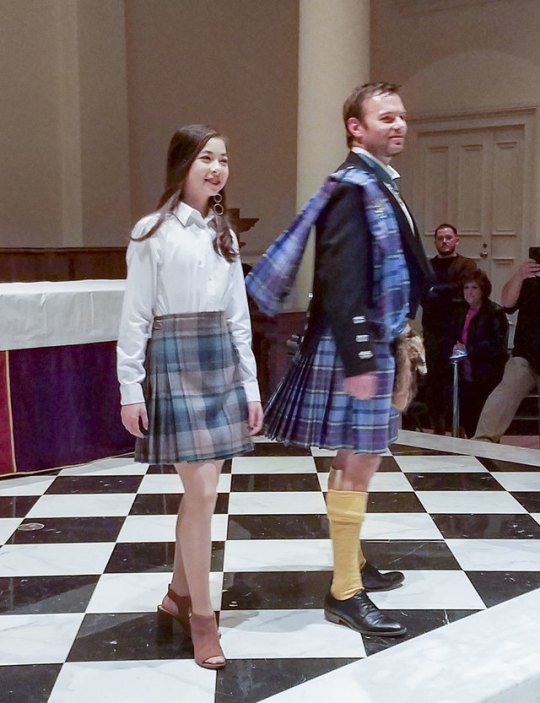
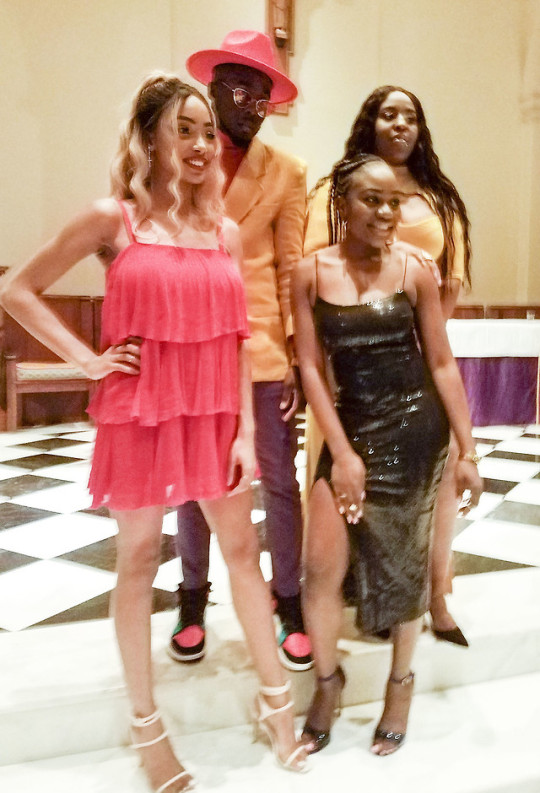
Dressed to Kilt by j- No
Via Flickr:
Church of the Holy Apostles Manhattan NYC March 5, 2019
Dressed to Kilt’s return to New York on Friday night was a hit with a celebrity fashion show featuring kilts and kitsch and cool Native American designers as a fun twist to celebrate diversity. The fashion show featured designers from Scotland and some Native American tribes along with the runway debut of a LGBTQ tartan worn by Scottish TV personality Phil MacHugh. The show featured fun spectacles and delights to keep the crowd entertained ranging from Native American dance numbers to famed rugby player brothers strutting shirtless down the runway, and even live falcons (birds, not footballers) making a catwalk appearance. The fashion show was followed by a cocktail party and buffet along and beats spun by DJ Johnny that had guests dancing the night away.
Guests were greeted at the entrance of the Church of the Holy Apostles to a traditional Scottish bagpiper and treated to delectable nibbles before the show started. The crowd was treated to incredible designs from Native American designers Shyanne Brant, Stacey Mitchell, Sparkling Spur, Red Berry Women and Wabigonikwe Tenasco reminding guests of the incredible rich history and talent of Native Americans that is often ignored by the fashion community. Designers from across the pond such as Lucan Fashion, Ediburgh based label Totty Rocks, Calzeat and Walker Slater reminded the crowd what true craftsmanship and heritage looks like. A nod was made to the outdoor lifestyle arena with designs from Horse Country Saddlery. In addition to these special designs, kilts and the Navy SEAL Foundation Tartan highland dress. A very special LGBTQ Tartan quilt made its debut on American runways last night really ringing in the message of inclusivity for the evening.

The guest list included a bevvy of celebs, influencers, media and incredible military notables such as: Pat and Michael Parry, Goldstar parents of fallen Navy Seal Brian Bill; Robin King, CEO of the Navy Seal Foundation; 911 Survivor Andrew Cullan and Navy SEAL and Medal of Honor recipient Master Chief Edward Buyers and his family.
Dressed to Kilt has developed a cult-like following for those seeking some good Scottish fun and many celebrities with Scottish roots have dawned the catwalk.
From its genesis in 2003, DTK is now the largest and most prestigious Scottish fashion event in the world, and one of the highest profile fashion shows in the United States. cultures become hollow. The show is produced by the Friends of Scotland charity which was co-founded by Sir Sean Connery in 2002. The charity has raised significant sums for the families of wounded veterans. For more information, please visit www.dressedtokilt.com
0 notes